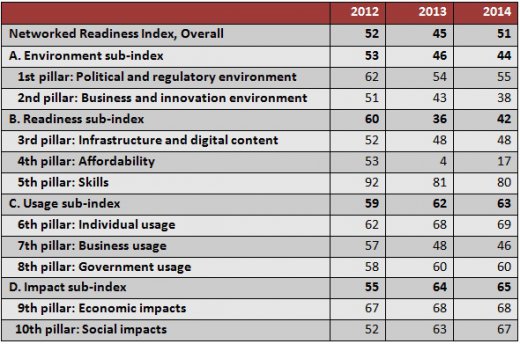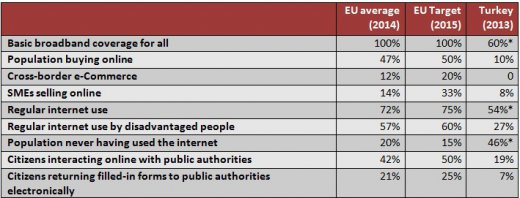Towards the Internet Governance Forum 2014: Turkish Economy’s Networked Readiness
World Economic Forum’s (WEF) Networked Readiness Index 2014 was recently released. Since 2012, this study ranks countries in terms of their ability to use ICT for their economies’ competitiveness and citizens’ wellbeing. The top places are, as expected, full of Asian Tigers and Nordic economies. Turkey ranks as 51st, moving down from 46th place in 2013. Its rankings in the sub-pillars have mostly remained stable during the past three years, meaning some very problematic areas have not undergone much of an improvement. (Table 1)
According to the index, the most problematic area is Turkey’s set of ICT skills. This subindex is measured by enrollment rates and executive opinion surveys. While it is true that education should be seen as a long term investment, targeted programs should yield improvements in the short run, especially for issues like digital literacy. The lack of necessary skills can seriously hinder the development of ICT sector. It can also prevent the diffusion of these technologies for a more productive economy. Another problematic area is the individual usage pillar. This subindex, measured by a number of indicators such as households with internet access and mobile internet subscriptions, shows that the progress made so far in terms of households’ digital adoption is far from impressive. A comparison with EU averages presents a similar issue. (Table 2.) The ICT Usage Survey on Households and Individuals 2014 data was released last week. According to the figures by Turkstat, households with access to the internet increased from 42 percent in 2011 to 60 in 2014. E-commerce grew by 35.5 percent in the last four years. Share of people using the internet to sell goods and services increased from 9 percent in 2013 to 16.5 in just one year. These figures, though encouraging, still lag far behind EU average and imply considerable room for improvement.
What the rankings tell us is that broadly speaking, the advancements Turkey made in information technology has not made much of a difference compared to other countries, because other countries are –on average- progressing with a similar pace. Is this a problem? As economists like to put it, it depends: For a country aspiring to increase its GDP per capita from 10,600 USD to 25,000 in the next 10 years, it is. For one whose growth has been fueled by between-sector productivity and rapid urbanization fuelling growth in the last few decades, even more so.
Public authorities seem to be aware of this issue, hence, policy documents and public discourse in Turkey are rife with buzzwords about technology. (However, Turkey is hardly alone in its seemingly ardent endeavor in embracing the digital revolution: As of 2012, 120 of the world’s countries had adopted a broadband policy of some sorts.) Turkey is to host Internet Governance Forum on September 2-5, 2014. Yet, digitally speaking, this has been a rather eventful year: Twitter and Youtube were consecutively blocked, a new law was passed on controversial web control, yielding too much discretionary power to public authorities and was amended due concerns raised by experts and civil society.
The digital revolution can bring many (foreseen and unforeseen) challenges as well as endless possibilities. It looks like disruptive technologies are here to stay. WEF rankings show that Turkey can do far better in terms of improving its networked readiness, be it political and regulatory environment, or digital skills. Creating a digitally conducive environment for its firms and people is the key to solving next decades’ productivity challenges. The internet is a little more than an electronic cat database.
Table 1: Networked Readiness Index Rankings, 2012-2014

Source: WEF
Table 2: EU Digital Agenda Scoreboard and Turkey

Source: EC, Turkstat
* 2014 values from Turkstat
* Bilgi Aslankurt, Economic Studies, Research Associate




